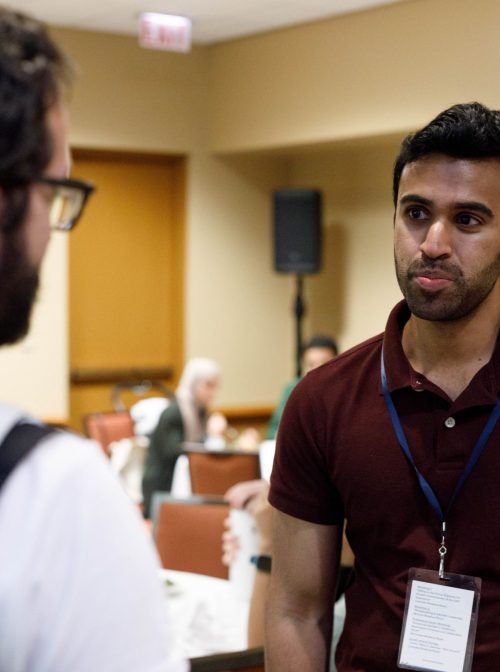Sitting across from my old friend Lisa in a bustling café, I had no idea that our conversation would lead me down a journey of self-discovery. As we caught up, Lisa began sharing the profound role that Christianity played in shaping her daily life.
She spoke passionately about how her faith in Christianity influenced her nursing profession. She found comfort in being part of a centuries-old tradition steeped in rituals, sacred texts, stories, and a close-knit community. Whenever Lisa or one of her patients encountered sadness or adversity, she would offer words of comfort by referencing a Bible verse. Interestingly, Lisa then asked me a thought-provoking question: Where do you find solace in your own life?
As I listened to her question, my mind momentarily stopped. I grew up with the Hindu faith, visited temples, learned about mythologies, and celebrated festivals with my family. However, I hadn’t found solace in the tradition. Hinduism shaped my cultural identity, but it didn’t resonate with me on a spiritual level.
Leaving that conversation, my mind overflowed with questions about my worldview. After engaging in deep introspection, I came to realize that my solace originated from the communities I belonged to, their shared moral values, and their service-oriented nature. I found inspiration in their stories of triumph over adversity, and I sought comfort in the scientific process that underpins our society. The absence of an organized religious tradition providing me with definitive answers to life’s mysteries did not leave me disconcerted. Instead, I found beauty in embracing the unknown.
This led me to agnosticism, a belief that acknowledges the ultimate reality as unknown or probably unknowable. According to a study conducted by the Pew Research Center in 2021, 5% of U.S. adults identify as agnostic. Among agnostics, the focus is not on denying the existence of God or a higher power, but on recognizing that life’s profound questions may not have definitive answers. While this realization can unsettle many individuals, it offered me a sense of comfort.
Being agnostic has fostered a deep sense of curiosity within me. Following a belief system that acknowledges uncertainty about a higher power has granted me the freedom to question, explore, and embark on an endless quest for knowledge and understanding. This acknowledgement of the unknown fuels my intellectual curiosity, particularly regarding religion, identity, worldview, and culture.
Following a belief system that acknowledges uncertainty about a higher power has granted me the freedom to question, explore, and embark on an endless quest for knowledge and understanding.
Engaging in conversations with individuals like Lisa about the aspects that hold deep importance to their spiritual identities is both inspiring and meaningful to me.
Being agnostic has also taught me the importance of empathy. As I do not align with a specific religious doctrine, I find inspiration in stories from multiple traditions that possess universal appeal. Accepting this recognition of religious and philosophical diversity has deepened my understanding that the search for truth and inner peace is a personal journey. This realization has nurtured a deep sense of empathy within me, allowing me to empathize with others on their own quests.
Agnosticism has cultivated humility within me. Embracing the unknown has led me to recognize the limitations of human understanding. Therefore, I approach life and its mysteries with a sense of intellectual modesty. This humility empowers me to engage in meaningful dialogues with individuals who hold diverse viewpoints, fostering an environment conducive to learning, growth, and mutual understanding.
One of the most transformative aspects of being agnostic is how it challenges my biases and assumptions. Without subscribing to a specific religious ideology, I am constantly questioning my own preconceptions. I actively acknowledge and scrutinize the personal biases shaped by societal norms, cultural conditioning, and personal experiences. I aim to approach every interaction with an open mind and strive to cultivate a more inclusive understanding of the world.
Agnosticism has influenced my philosophical perspective and encouraged me to embark on a journey of interfaith exploration. The next time I meet my friend Lisa, I will have an answer to her question: Where do you find solace in your own life? I find solace in individuals like her, fellow humans who dedicate their lives to serving their communities through noble professions like nursing.
As an agnostic, I value the time we spend on this planet, and any effort to make it a better place brings me peace.
Suraj Arshanapally, MPH is a Health Communication Specialist for the Centers for Disease Control and Prevention. Suraj holds an MPH in Social and Behavioral Sciences from Yale University and a BS in Public Health from Saint Louis University. He believes that interfaith cooperation is a vital component to a healthy society and enjoys using his interfaith leadership skills to address public health issues. Suraj is a member of the Emerging Leaders Network for Interfaith America. With Interfaith America, he has previously served as a Better Together Coach, Interfaith Innovation Fellow, Emerging Leaders Mentor, and a trainer for the Interfaith Leadership Summit.
This article was written by Suraj Arshanapally in his personal capacity. The opinions expressed in this article are the author’s own and do not reflect the view of the Centers for Disease Control and Prevention, the Department of Health and Human Services, Interfaith America, or the United States government.




